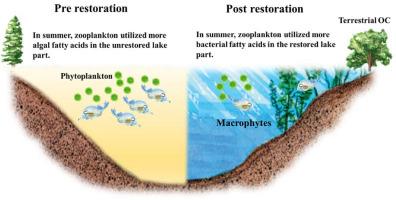Comparison of zooplankton assimilation of different carbon sources and fatty acids in a eutrophic lake and its restored basins
IF 8
2区 环境科学与生态学
Q1 ENVIRONMENTAL SCIENCES
引用次数: 0
Abstract
The ecological restoration of eutrophic lakes significantly influences the food composition of zooplankton. Zooplankton serve as the principal trophic link, transferring energy from phytoplankton to fish. Understanding the alterations in zooplankton carbon source compositions following ecological restoration and the seasonal variations in this relationship is crucial. This study employs stable carbon isotope (δ13C) and fatty acid (FA) analyses to investigate the seasonal changes in carbon source contributions to zooplankton between the restored and unrestored segments of Lake Xuanwu. Results from FA analysis reveal higher proportions of algal dietary markers in zooplankton FAs in both segments during spring and autumn. Summer exhibits a shift with zooplankton utilizing more bacterial FAs in the restored part and more algal FAs in the unrestored part. While approaching winter, zooplankton in the restored part consume more algal FAs but less in the unrestored part. Zooplankton FAs enriched in δ13C are associated with assimilation of more terrestrial carbon, contrasting with depleted δ13C when zooplankton relies more on phytoplankton. Isotope mixing models indicate a substantial contribution of terrestrial carbon to zooplankton carbon sources, especially in autumn (42.3% unrestored, 51.2% restored) and winter (41.4% unrestored, 36.8% restored), while phytoplankton has a higher contribution in summer (34.5% restored, 46.9% unrestored). These findings contribute to a comprehensive understanding of carbon cycling variations in food webs between eutrophic lakes and ecologically restored lakes.

富营养化湖泊及其恢复流域浮游动物对不同碳源和脂肪酸的同化作用比较
富营养化湖泊的生态恢复极大地影响着浮游动物的食物组成。浮游动物是主要的营养环节,将浮游植物的能量传递给鱼类。了解生态恢复后浮游动物碳源组成的变化以及这种关系的季节性变化至关重要。本研究采用稳定碳同位素(δ13C)和脂肪酸(FA)分析方法,研究了玄武湖修复湖段与未修复湖段浮游动物碳源贡献的季节性变化。脂肪酸分析结果显示,在春季和秋季,两个湖段浮游动物脂肪酸中藻类食物标记物的比例都较高。夏季浮游动物的膳食结构发生了变化,修复湖段的浮游动物更多地利用细菌膳食结构,而未修复湖段的浮游动物则更多地利用藻类膳食结构。临近冬季时,修复部分的浮游动物消耗更多的藻类脂肪酸,而未修复部分的浮游动物则消耗较少。浮游动物富含δ13C的脂肪酸与同化更多陆地碳有关,而当浮游动物更依赖浮游植物时,富含δ13C的脂肪酸就会减少。同位素混合模型表明,陆地碳对浮游动物碳源的贡献很大,尤其是在秋季(42.3%未修复,51.2%已修复)和冬季(41.4%未修复,36.8%已修复),而浮游植物在夏季的贡献更大(34.5%已修复,46.9%未修复)。这些发现有助于全面了解富营养化湖泊与生态修复湖泊之间食物网的碳循环变化。
本文章由计算机程序翻译,如有差异,请以英文原文为准。
求助全文
约1分钟内获得全文
求助全文
来源期刊

Journal of Environmental Management
环境科学-环境科学
CiteScore
13.70
自引率
5.70%
发文量
2477
审稿时长
84 days
期刊介绍:
The Journal of Environmental Management is a journal for the publication of peer reviewed, original research for all aspects of management and the managed use of the environment, both natural and man-made.Critical review articles are also welcome; submission of these is strongly encouraged.
 求助内容:
求助内容: 应助结果提醒方式:
应助结果提醒方式:


